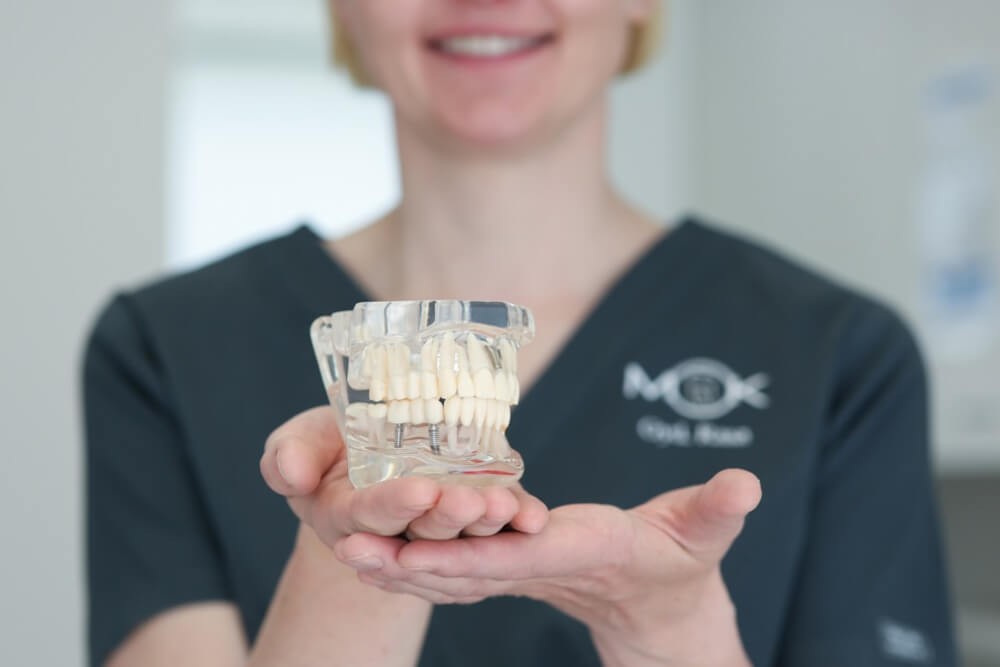Dental implants are designed to restore one, several or all lost teeth. As we are moving forward with technologies, we offer our patients only modern treatment solutions. Our specialists focus exclusively on long-term results, so accurate diagnostics and detailed treatment planning is of utmost importance. We use only high-quality, time-tested dental implants and prosthetic materials that help to restore functional and aesthetically pleasing teeth.
.png) How to overcome Your fear?
How to overcome Your fear?
Dental implantation these days is comfortable enough if You entrust it to the hands of an experienced professional. The procedure is performed under local anesthesia, so it is completely painless, and it takes only 20-30 minutes to insert one implant. Patients are also motivated by a perspective of the final result: an aesthetic smile, comfortable chewing, increased self-confidence, and the ever-forgotten discomfort associated with lost teeth. The sooner You prepare for dental implantation procedure, the easier it will be.
Failure to restore teeth can have dire consequences
Teeth
It is enough to lose only one single tooth, and the adjacent teeth also start changing their position and one after the other move towards the gap.
Facial aesthetics
When teeth are lost, one’s face becomes unattractive, a person looks much older. This happens not only because of missing teeth, but also due to jaw bone resorption. Without the necessary chewing load, jaw bone melts and that affects facial aesthetics: the lower third of face shortens, chin moves forward, corners of lips tilt down and wrinkles form around lips, face does not look firm anymore.
 General health
General health
Melting jaw bone and changes in occlusion have negative effects not only on facial aesthetics, but may also provoke temporomandibular joint disorders. In addition, poor chewing function caused by tooth loss eventually leads to indigestion and other health problems due to a limited diet.
Phonetics
When one or more teeth are lost, one’s speech becomes unclear and incoherent.
Emotions
People who have lost their teeth often face discrimination: when a smile is unattractive, it is really difficult to properly represent themselves. They lose their self-confidence, start avoiding public events, communication and rarely smile. The loss of teeth causes a significantly deteriorating quality of life, which is a real psychological challenge.
Financial matters
Delays in restoring lost teeth make future dental treatment more complicated. Dental implantation takes much longer and is way more expensive, when additional procedures like bone augmentation are required.
The process of teeth restoration
Diagnosis and treatment plan
During consultation, a patient expresses current complaints and expectations about the future smile. A doctor then examines the patient’s mouth, performs the necessary diagnostic tests to assess jaw bone volume and suggests optimal methods for dental implantation. A treatment plan is drawn up and the stages of treatment are discussed with the patient.
Bone augmentation
Bone augmentation is only required when dental implant placement has been delayed and jaw bone has severely degenerated during that time. The artificial bone restores the missing volume of jaw bone so that the implants can then be safely inserted in the exact locations assigned to them. This ensures stable integration of dental implants and their longevity, and restores the appropriate proportions of patient's face. Bone augmentation material fully connects with the natural jaw bone in about 6 months, at which point the implants can be placed.
Implant placement
The number of implants needed depends on the individual situation and the method of chosen dental restoration, which You will discuss with the doctor performing the procedure. If several adjacent teeth are being restored, 2 implants may be inserted and a bridge of three interconnected artificial teeth can then be attached to them. When restoring a completely toothless jaw, at least 4 implants must be placed to which a non-removable prosthesis is then attached. In order to restore all missing teeth in one jaw with separate dental bridges, thus ideally reproducing the properties of natural teeth, 6-8 implants must be inserted.
When one tooth is missing
When multiple teeth are missing
When all teeth are missing
Prosthetics
While implants heal, patients usually wear temporary dentures. After about 3 months, implants completely integrate and permanent crowns may be attached. They are individually manufactured in dental technicians’ laboratories, applying the highest aesthetic standards in order to ensure that the newly restored teeth do not differ from the natural ones and function perfectly. The use of high-quality materials allows to create strong and aesthetically pleasing artificial teeth. One of the most popular and particularly durable prosthetic materials nowadays is zirconium ceramics. The ability of zirconium ceramics to reflect light gives artificial teeth an exceptionally natural appearance.
Prophylaxis
The longevity of newly restored teeth depends not only on the dentist's competence and the quality of implants or prosthetic materials, but also on the patient's awareness. The same amount of time should be spent on the care of artificial teeth on implants as on natural teeth: clean them twice a day, visit Your dentist regularly and periodically perform professional oral hygiene.



